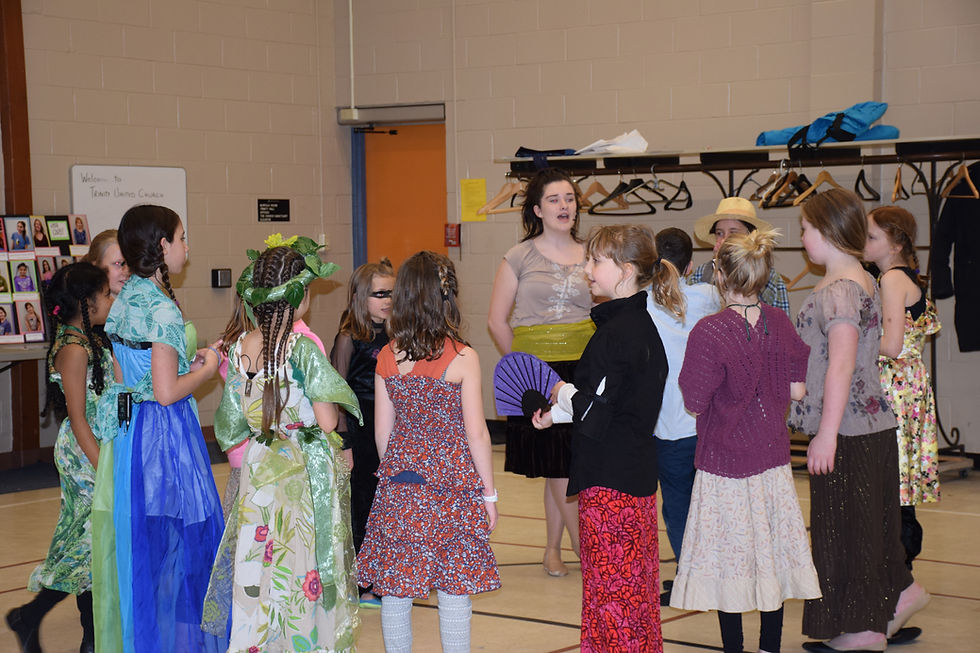Top Tongue Twisters for Theatre Students
- centrestagekids
- Apr 11, 2024
- 4 min read
Updated: May 12
Tongue twisters aren’t just silly fun—they’re actually one of the best tools an actor can use! They help sharpen your pronunciation, stretch your vocal muscles, and give you that extra boost of confidence when it’s time to perform. For theatre students, playing with tongue twisters is a great way to improve clarity, diction, and overall delivery. After all, when you’re on stage, every word counts!
They’re especially great for young performers—adding tongue twisters to your warm-up routine can create a sense of structure, help ease stage fright, and get you feeling focused and ready to shine. Plus, they’re just plain fun! Below, I’ve shared some of my favourite tongue twisters to challenge even the most seasoned performers—along with a few reasons why they’re so worth practicing.

Top Tongue Twisters for Theatre Enthusiasts
Peter Piper
Classic: "Peter Piper picked a peck of pickled peppers.
Make it harder add: " How many pickled peppers did Peter Piper pick?"
"Peter Piper picked a peck of pickled peppers. How many pickled peppers did Peter Piper pick"
This twister challenges you to handle those "P" sounds without losing speed or clarity—it's all about nailing that balance!
Betty Botter
Classic: "Betty Botter bought some butter, but, she said, the butter’s bitter;
Make it harder add: "If I put it in my batter, it will make my batter bitter, but a bit of better butter will make my batter better."
"Betty Botter bought some butter, but, she said, the butter’s bitter. If I put it in my batter, it will make my batter bitter, but a bit of better butter will make my batter better."
Focus: Smoothly shifting between the "B" and "T" sounds. It’s key to keeping your story flowing and making sure your words land just right on stage!
She Sells Sea Shells
Classic: "She sells sea-shells by the sea-shore. "
Make it harder add: "The shells she sells are sea-shells, I'm sure. For if she sells sea-shells on the sea-shore, then I'm sure she sells seashore shells."
She sells sea-shells by the sea-shore. The shells she sells are sea-shells, I'm sure. For if she sells sea-shells on the sea-shore, then I'm sure she sells seashore shells
Getting the hang of the "Sh" and "S" sounds is a game-changer! These sounds can easily get all muddled up when we’re speaking fast, but mastering them helps you sound super sharp and clear on stage.
Woodchuck Chuck
Classic: "How much wood would a woodchuck chuck if a woodchuck could chuck wood? "
Make it harder add "He would chuck as much wood as a woodchuck would if a woodchuck could chuck wood!""
"How much wood would a woodchuck chuck if a woodchuck could chuck wood? He would chuck as much wood as a woodchuck would if a woodchuck could chuck wood!"
Goal: Nail those "W" sounds and keep your rhythm steady—it's all about hitting that perfect pace!
My Mother Made Me Mash My M and M's Classic: My Mother Made Me Mash My M and M's Make it harder add make it faster and faster Goal: Consistency in "M" sounds and rhythmic pacing and changing from the "Ma" to the "Mmm"
Unique New York, Unique New York Simple but not: Unique New York, Unique New York Make it harder: Try it faster, try to add the emphasize on different syllables. Goal: Mastering the "U" and "N" sounds means making big, slower mouth movements and really focusing on those consonants!

Why Tongue Twisters?
A) Sharper Articulation and Clarity: Tongue twisters are like a gym for your mouth! They train your tongue and lips to move quickly and clearly—perfect for those fast-paced lines or tricky Shakespearean moments where every word counts.
B) Vocal Warm-up and Flexibility: Think of tongue twisters as a warm-up for your voice. Just like you’d stretch before a workout, they get your vocal cords ready and help you stretch your pronunciation skills, making it easier to switch up tones, speeds, and character voices.
C)Memory and Focus Boost: Trying to master a tongue twister? It’s a memory workout too! Repeating them strengthens your recall and focus, which is exactly what you need to stay sharp on stage and own your performance.
D)Confidence on Stage: The more you practice tongue twisters, the more confident you’ll feel delivering your lines. Whether it’s an audition, a big performance, or a new rehearsal challenge, you’ll walk in with more assurance and poise!
E) Fun and Team Spirit: Let’s be real—tongue twisters are a blast! They’re a great way to kick off rehearsals, build some team spirit, and remind everyone that, while theatre is hard work, it can also be ridiculously fun.
Incorporating tongue twisters into your performer's routine is a simple but powerful way to boost your speech and performance. Whether you’re warming up, strengthening your skills, or just having some laughs, these playful little phrases are a great reminder that every stumble is just a step toward being an even stronger, more confident, and versatile performer.
Have you checked my FREE actor's warm-up scroll down to get it now.







Comments